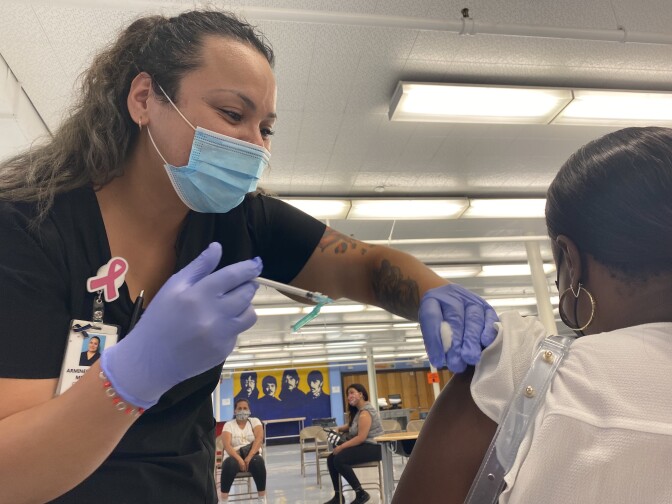This story is free to read because readers choose to support LAist. If you find value in independent local reporting, make a donation to power our newsroom today.
California breaks with CDC, cosigns COVID vaccine guidelines from medical groups

Breaking with national public health policy, California officials are recommending that children 6 months to 2 years old, as well as people who are pregnant and lactating, should get vaccinated against COVID-19, following guidance from reputable medical groups.
In a statement to KQED, the California Department of Public Health said Wednesday that it endorses recent recommendations from the American Academy of Pediatrics and the American College of Obstetricians and Gynecologists for COVID-19, influenza and RSV vaccines.
The guidance, released last month, was in line with the U.S. Centers for Disease Control and Prevention’s recommendations under the Biden Administration.
“As a part of our efforts, along with our West Coast state partners and other states around the country, to provide a unified science-based approach to protecting the health of our communities, California is carefully considering guidance from various trusted national medical professional and scientifically based organizations,” the CDPH said.
Typically, the CDC sets vaccine recommendations based on the available data, which insurers use to set reimbursement guidelines. But under the direction of Health and Human Services Secretary Robert F. Kennedy Jr. — who has espoused virulent anti-vaccine rhetoric for decades — the CDC now only recommends COVID vaccines for “most adults ages 18 years and older.”
That left many in the medical community concerned that confusing and inconsistent messaging would cause vaccine rates to drop, and even make vaccines unaffordable for lower-income families whose insurance providers may no longer cover them.
Dr. Abraar Karan, an infectious disease physician at Stanford University, said the state is making a “wise” choice because data show that vaccines help minimize COVID-19 infections in typically healthier populations like children older than six months and young adults, and reduce the risk of urgent care and emergency room visits for COVID-19 patients “by 33%.”
“That’s pretty significant, and sort of mirrors what you see with flu vaccines as well. Functionally, that is what we are hoping for, for the general population, is to make you get less sick, fewer days of [missed] work [and] less utilization of the health care system,” Karan said.
“COVID spreads in waves. We have multiple waves per year, and they do require a large usage of our health care system. So if we have a safe, effective vaccine to reduce that healthcare usage in that healthier group, that’s important.”
Karan said that because California is following the guidance of leading medical groups, it’s likely insurance companies will cover the shots.
More importantly, he said, those states are adhering to the evidence.
“Whereas what is happening at HHS is … a lot of opinions, particularly from RFK Jr. himself, on unproven therapeutics, on risks that are not borne out by the data. And then he’s sort of just hand-waving and doing whatever he wants,” Karan said.
In June, Kennedy removed all 17 members of an advisory committee that helps the CDC form its vaccine policies to begin to “restore public trust in vaccines.”
Dr. John Swartzberg, professor emeritus of infectious diseases and vaccinology at UC Berkeley’s School of Public Health, said that by following the advice of leading medical groups, California and the other states of the West Coast Alliance are making it easier for families to get their children vaccinated against COVID-19.
“When you look at the data for very young children in terms of hospitalization and death, the rates are pretty comparable to older Americans,” Swartzberg said. “This is a vulnerable population where protection is terribly important. So I think that the California Department of Public Health, in following the advice of the American Academy of Pediatrics, is spot on.”
Swartzberg said it is interesting to note that President Donald Trump even pushed back on Kennedy’s anti-vax stance in the last few days. Trump even expressed some skepticism about Florida’s push to phase out all childhood vaccine mandates.
“I think there are people in the administration who recognize that this is a hot button item, and all the Republicans are not really on board with where Kennedy is, so that might translate into the administration not trying to make a political football out of this with California,” he said. “We are very fortunate here in California. We have a department of health that is science-based and really solid.”
Who can get a new COVID vaccine right now?
The updated 2025–26 COVID-19 vaccines are currently available at CVS, Walgreens and Safeway pharmacies in California.
(Pharmacies take their cue from the federal government, not the states, so they’ve always been the first places that COVID-19 vaccines roll out — before shots become more widely available through providers and public health authorities.)
These pharmacy appointments are only available to people who, during the online booking process, say they are either:
- Age 65 and older
- Have a health condition that could make someone at higher risk from COVID-19
But what counts as “high risk”? To find out if you or a family member might qualify, you can consult the CDC’s current list of health conditions that potentially put you at higher risk of severe illness, hospitalization or death from COVID-19, which includes cancer, chronic lung, kidney and liver disease and certain disabilities. However, it also encompasses other factors like mental health conditions — including depression — obesity and being a current or former smoker.
When listing some of these conditions, CVS’s online appointment also suggests “any other conditions or situations that place you at higher risk of severe illness from COVID-19 (consult your pharmacist or medical provider if you need help).”










